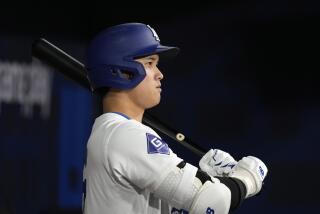Japan Fears Being Bush’s Scapegoat
- Share via
TOKYO — A recent editorial cartoon pictured President Bush standing in a sinking rowboat seeking help from Japanese Prime Minister Kiichi Miyazawa. Miyazawa has put out his hand to help but finds himself being pulled into the water by the frantic Bush.
The cartoon sums up much of the sentiment surrounding Bush’s visit to Japan next month.
Building a new world order was the topic Miyazawa originally had in mind when Bush first scheduled his visit for November.
Bush’s last-minute decision to come to Tokyo with a battery of American corporate leaders is seen as a show of force to help open Japanese markets and, as Bush put it, “to break down intransigence where we find it.” But the move is being seen here as a desperate and rather rude attempt to use Japan as a scapegoat to draw attention away from Bush’s economic problems at home.
Miyazawa has shown patience with Bush’s efforts to turn the planned summit meeting, which begins Jan. 7, into a confrontation on trade. With America’s economy in poor shape and auto workers being laid off by the thousands, “We must do as much as we can” to help America, Miyazawa told a group of business leaders Wednesday.
Miyazawa has ordered his bureaucrats to bend over backward to meet American demands that Japan change auto emissions standards for imported cars in order to give American cars a break in Japan. He also wants Japan’s auto industry to cut its exports to the United States. Japan is expected to export 1.7 million cars to America this year, far below the 2.3-million level established under a voluntary restraint program. But Japan has been reluctant to lower its official export ceiling, as U.S. companies have demanded.
While Bush is here, Miyazawa also plans to offer to help America finance its $8.2-billion project to build a “superconducting super collider” in Texas.
But although Miyazawa has much of the government bureaucracy working through the New Year’s holiday season, it will be difficult to put together a package that Bush will find worth bragging about on his return. Miyazawa’s own political base is too shaky for him to promise any major breakthroughs, such as opening Japan’s rice market.
And even minor concessions, such as promises of increased automobile and auto parts imports, threaten to undercut support from within his own party. (Like Bush, Miyazawa’s support among the public has plummeted recently.)
Some analysts say Miyazawa has done well, given the constraints.
“He has managed to keep foreign aid growing rapidly by cutting defense spending and has supported strong growth in public spending to prime the economy,” said Masaya Itoh, a political commentator. “And Miyazawa is pushing very hard to come up with something for Bush to cement U.S.-Japan relations. But you can’t force people to buy American cars if they don’t want them.”
More to Read
Sign up for Essential California
The most important California stories and recommendations in your inbox every morning.
You may occasionally receive promotional content from the Los Angeles Times.













